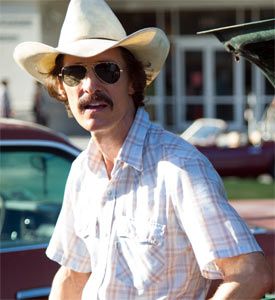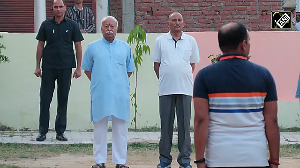 'This is a stirring, touching film but it stays impressively away from overt manipulation.'
'This is a stirring, touching film but it stays impressively away from overt manipulation.'
'It is a film about smarts,' says Raja Sen after watching Dallas Buyers Club.
Somewhere around the middle of Dallas Buyers Club, the protagonist slips on a clerical collar, his moustache gravely weighed down to cover what may unmistakably be declared a sinner's grin.
A man caught smuggling medicines into America, he solemnly gives his word that they are all for his personal consumption.
He swears with the kind of loud sincerity only the charlatan can muster, and -- just as soon as he's out of earshot -- is selling unapproved drugs.
This man, Ron Woodroof, is a decidedly unlikely hero, a man who stumbles upon his nobility via efficiency and denial, a man who refuses to accept the fate handed to him, and, most importantly, a man willing to learn and to share.
He drinks hard, screws hard and harbours rodeo dreams till he learns he's running out of time, fast.
Director Jean-Marc Vallee's film is the inspiring true story of Woodroof and his quest to bring the right healthcare to AIDS patients at a time when America's Food and Drug Administration seemed unwilling to do the same.
And while he was indeed a pioneer, the true strength of Vallee's film is the way it doesn't shy away from showing Woodroof's less likeable side.
And there's a lot to flinch at, from his brutal homophobia to his rattlesnake lifestyle and his (initially) obnoxious cockiness.
The year is 1986, Americans are just beginning to come to terms with the fact that Rock Hudson has died of AIDS, but Woodroof mourns the number of women Hudson could have conquered if straight.
And then he -- an electrician with a fondness for shortcuts -- is told he has AIDS and has 30 days to live.
Vallee's film gives us the character, warts and all, but even more importantly keeps the focus on his decisions.
A scavenger, his first reaction (after yelling at doctors defiantly) is to read up on AIDS and HIV, after which he starts learning about medication. He realises that the medication approved by the FDA isn't what
Woodroof is indeed doing something huge, but the film scores by refusing to sentimentalise his actions; he starts off doing what's best for himself, and then finds an opportunity.
Nobility or altruism isn't a part of his plan, but he clings to the idea of helping people because -- like the rest of his decisions -- isn't that the only way forward?
This is a stirring, touching film but -- unlike say its fellow Oscar nominee, the well-crafted 12 Years A Slave -- it stays impressively away from overt manipulation.
Dallas Buyers Club is a film about smarts.
It's also a film about swagger. Matthew McConaughey drains himself out to play Woodroof, losing a couple of dozen kilos of weight, but despite his impoverished form, wears his hat high and keeps his hubris impossibly alive.
He's gaunt as a grasshopper, and yet plays the character as if his name were Eastwoodroof, with a world-beating swagger and a stetson. It's a striking performance, a character confident and unpredictable and clever and so goddamned charming.
Charming enough to take a painting of flowers along for a date when he doesn't have time to stop for a bouquet.
Woodroof finds a partner in Rayon -- a punk-rock transsexual played with both Eltonian flamboyance and wonderful fragility by Jared Leto -- and the two change the world around them even as their words affectionately head for each other's throats.
Jennifer Garner plays a doctor who eventually swings over to their side, and despite an underwritten character with a weak, almost-romantic subplot, the actress is suitably helpless enough for the audience to empathise with.
Like McConaughey in the film, the real Ron Woodroof outlasted his death sentence by a fair bit, going on to live for 7 years instead of the month the doctors allotted.
In that bit he helped many a sufferer, but his motivations were as fundamental as can be: he wanted to survive, to defy death. Saving lives along the way felt like an inevitability.
Now that's the film's knockout punch.
Rediff Rating:











 © 2025
© 2025